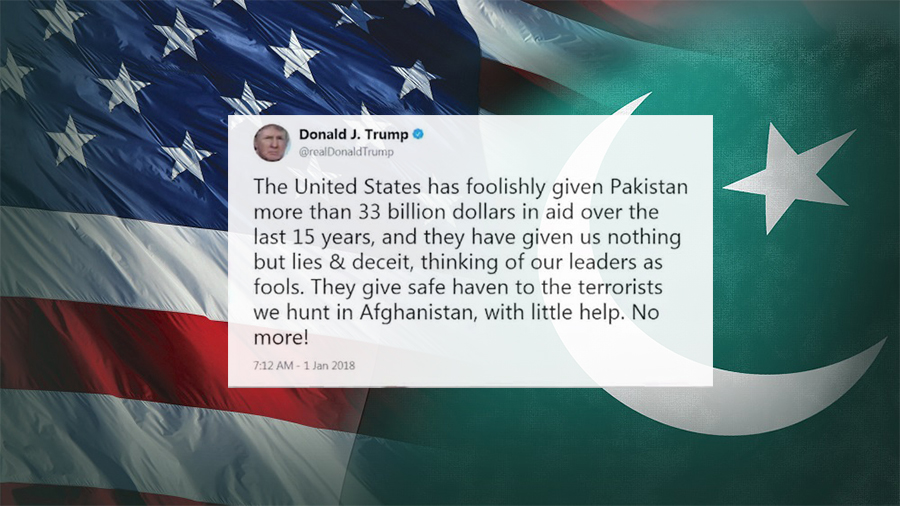President Donald Trump has accused Pakistan of lying and deceiving the United States while receiving billions of dollars in foreign aid. In his first tweet of the year, he also alleged Pakistan harbored terrorists. This is perhaps the strongest indication that the long Pak-US relationship is at an end.
Pakistan reacted angrily to the tweet, saying all the funding was accounted for and that Mr Trump was bitter due to the "US defeat in Afghanistan". The US is considering withholding more than $250m (£185m) in aid that it delayed sending to Islamabad in August.
"The United States has foolishly given Pakistan more than 33 billion dollars in aid over the last 15 years, and they have given us nothing but lies & deceit, thinking of our leaders as fools," Mr Trump wrote. He added: "They give safe haven to the terrorists we hunt in Afghanistan, with little help. No more!"
Pakistan's Foreign Minister Khawaja Asif told Pakistan's Geo TV: "We have already told the US that we will not do more, so Trump's 'no more' does not hold any importance, "Pakistan is ready to publicly provide every detail of the US aid that it has received."
For many the abrupt tweet of Trump is the long culmination of the torturous saga of the US-Pakistani relationship. The two nations who had been steadfast allies have been drifting apart since the end of the cold war. The US came to Pakistan in order to utilize the geostrategic location for its contest for global domination against the USSR. The newly founded state of Pakistan needed a strong patron against the existential threat of its eastern neighbor, India.
However, the divergent interests of both nations would be stumbling blocks across the road. Particularly constant attempts by the USA to tempt Pakistan’s mortal enemy India with weapons and money was a constant sticking point. There however would be highs and lows in the relationship when it suited the USA such as during the Soviet Afghan war and the US led occupation of Afghanistan for which it needed Pakistan.
It was the later military campaign which has seen the massive rift in the two allies. However, such tensions come in the backdrop of several major events. On a worldwide scale we can see a great strategic shift occurring with a return of multipolarity as a resurgent Russia and a rising China displace the waning influence of the US. On a state level, the USA is in turmoil as waning fortunes abroad combine with an economic decline and rise in extreme nationalist feelings combine to generate an isolationist xenophobic political attitude.
But perhaps it is on the individual level that the events become clear. Trump is a personality that is seen to be under a lot of political pressure. His approval ratings are extremely low for a US president in his first year. His party has recently lost a crucial election in a constituency considered a stronghold while he himself is under a critical investigation that may see him losing his presidency.
Under such immense pressure, Trump has been making a lot of divisive foreign policy decisions. His recent decisions include the recognition of Jerusalem as the capital of Israel, an attack on Iran, sabre rattling with North Korea and now attacking Pakistan.
It can be asserted that Trump’s recent assault on Pakistan is part of a wider stratagem. On one hand, Trump seeks to divert domestic attention and the other is to leverage Pakistan into somehow changing America’s inevitable defeat in Afghanistan into a victory or stalemate. It cannot be plausible that the Pak-US relationship will end with a single tweet. After all, the US has poured in nearly $78.3 billion to Pakistan between 1948 and 2016.
Such a huge investment cannot be simply thrown away at the click of a tweet. It can therefore be asserted that the Pak-US relationship is again entering another one of its signature low points owing to foreign and domestic factors.

